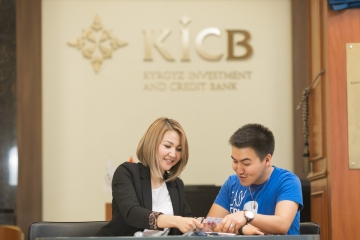To stimulate long-term economic growth in the country, AKDN operates across the spectrum, from small enterprise development opportunities that help poor rural households manage uncertainty, to productive physical infrastructure to corporate finance.
The Aga Khan Fund for Economic Development (AKFED) is one of the founders and a principal shareholder of the Kyrgyz Investment and Credit Bank (KICB), established in 2001. As of August 2016, KICB’s shareholders’ equity amounted to US$58.5 million, including the charter capital of US$17.5 million, making KICB the largest capitalised bank in Kyrgyz Republic. KICB currently serves over 415,000 clients with a customer deposit base of US$249 million.
The Bank has the one of the largest network, including 140 ATMs, 39 branches (in all oblasts of the country), with headquarters in Bishkek. The Bank employs over 800 people. KICB was recognised as the Best Commercial Bank of the year in 2013 and 2014 by Banker magazine and the Best Bank in Kyrgyz Republic in 2015 by EUROMONEY. In line with its core activity, KICB invests in long- and medium-term projects in Kyrgyz Republic’s main economic sectors, including agriculture, manufacturing, construction and light industry. Since its establishment, KICB has expanded into the retail market, becoming one of the top two commercial banks with total deposit base of US$249 million and one of the top three banks with gross loan portfolio of $148 million as of August 2016.
In line with regulators policy to increase the share of non-cash settlements and transactions, KICB also is the second biggest shareholder at the national processing center IPC (Interbank Processing Center), after the National Bank of the Kyrgyz Republic. KICB is actively promoting local and international banking cards such as ELCARD, VISA and UnionPay International.
In 2013, KICB expanded its product line with insurance services through the subsidiary "Jubilee Kyrgyz Republic Insurance Company" (JKIC). JKIC has launched life insurance policies -- a new product in the market. In 2013, KICB pioneered the issuance of corporate bonds among the commercial banks of banking sector with the purpose of supporting the national currency, and increasing capital market liquidity, in line with regulator’s policy. KICB has invested into establishment of its own Training Center, which has trained over 200 bankers, thereby growing the pool of bankers in the country.
In June 2014, KICB launched "ELSOM electronic wallet" to provide banking products even in very remote areas. ELSOM facilitates payment transactions. Users can receive and send money transfer internally and abroad. They can open bank/card accounts, link them to e-wallet and manage through mobile phone, or use e-wallets as deposit tool. Since its launch, over 250,000 users have created "Elsom" wallets reflecting a growing interest in the local population in innovative and reliable financial services systems. There are more than 3,300 service agents throughout the country providing ELSOM banking services through electronic wallets for non-cash goods and services sale.
KICB also offers student loans and financial literacy courses. In line with "Global Money Week", which is held worldwide, KIBC together with partners conducts training for children on financial literacy. KICB also funded the printing of 485 books in the braille font and 175 books in large type on the "History of Kyrgyzstan" for disabled children (blind and deaf) in Bishkek and Osh. KICB and partners initiated the Green Foundation to support the growth of the city in an ecologically responsible way. KICB’s efforts in the field of Corporate Social Responsibility were recognised by the International Business Council (IBC) with "Green Awards" in 2015.
The Mountain Societies Development Support Programme (MSDSP) recognises that having a range of income streams helps poor households manage uncertainty more successfully.
Access to reliable and well-managed water infrastructure can have a profound impact on rural livelihoods and improve cross-boundary dynamics between resource users.









